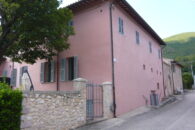A Buyer’s Guide: how the purchasing process works in Italy
Once your mind is made up and the price agreed you will be required to sign a Compromesso (private contract) and pay the statutory deposit. This agreement between buyer and seller states the price, the date for completion, what is being bought and sold, and also includes various guarantees from the vendor that he/she owns what he/she is selling and that the property can be sold to you as described. For example, if he states that there are no rights of way across the property then he must be able to transfer the property without any rights of way; if he cannot do so then he is in breach of the agreement and, if you are unwilling to accept the right of way, he must return double your deposit. It is very, very unusual for a deal to fall through after the Compromesso has been signed because the deposit is hefty, for a normal house 20 – 30% of the purchase price. This means that the purchaser does not go into the contract stage lightly, nor does the vendor. If the purchaser withdraws through no fault of the vendor, the deposit is forfeit and, as shown above, if the vendor cannot meet the terms of the Compromesso – or simply withdraws – then double the deposit must be returned to the purchaser. Estate agency fees are also payable with at the Compromesso stage.
Completion takes place before a Public Notary (Il Notaio) and his/her involvement is indispensable. Basically a government official, the Notaio witnesses the transfer of title from one party to another and collects the taxes due on the transaction. Contrary to popular belief the Notaio does not act for both parties; he acts for neither party, being – as stated – a witness. With all parties present he will identify them, one by one, and then read through the completion document (Il Rogito) in detail making sure that everyone understands what is being bought and sold. He will need proof that taxes and dues have been paid and he has to have ‘visure ipotecarie’ to prove what, if any, mortgages or debts burden the property. With all in agreement he will ask each party to sign and the Notaio will sign and stamp the document. It is at completion that you, as the buyer, must pay the remaining balance of the price of the property, plus the taxes and Notaio’s fees.
Once the transaction has been completed the Notaio will register the new title within twenty-one days. If you have taken a mortgage he will also register the mortgage deed. It may be some weeks, therefore, before you actually receive your copy of the registered title deed.
As with all property transactions anywhere in the world, there are additional costs to be paid when buying property in Italy. For the purchaser there are three main items; tax, notary’s fee and estate agent’s fee.
Umbrian Property have helped many individuals, organisations and companies to purchase property in Italy over a period of more than twenty years, helping them through the procedure in order to remove all the worries and pitfalls of house purchase abroad.
As professional Realtors, we make it our business to be aware of every local home or property on the market. We even know of properties that will become available, but have yet to formally be placed on the market.
If you give us some idea of what you are looking for, we will personally review all our sources of real estate listing information and send you everything within your price range that matches your criteria. It will save you a great deal of time!
Please give as many details as possible. If you’re looking for a home, include your preference for price range, preferred area (if known), square footage, number of bedrooms, one or two story, and any special features you want, such as a view or a fenced yard.
Call or email us for help, or to have your questions answered. Feel free to ask any questions at all!







